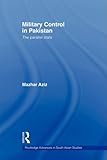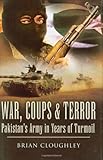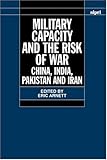Product Description
The military is entrenched in the corporate sector and controls the country’s largest companies and large tracts of real estate. So Pakistan’s companies and its main assets are in the hands of a tiny minority of senior army officials. Siddiqa examines this military economy and the consequences of merging the military and corporate sectors. Does democracy have a future in the new Pakistan? Will the generals ever withdraw to the barracks. Military Inc. analyzes the internal and external dynamics of this gradual power-building and the impact that it is having on Pakistan’s political and economic development.
Buy This book from Amazon Now! Shipping in Pakistan & Round the world available Click Military Inc.: Inside Pakistan’s Military Economy to buy now.







Every army in the world is different. The one we have sure knows who to do things. “INC” I dont know but for sure they are the strongest army in the muslim nation. With economy and resources like Pakistan they are still the best in Arab nation.
With saying that I strongly believe that there should be some “checks” on everyone Judiciary or Forces.. nobody is above the law.
Rating: 3 / 5
I haven’t read this book as yet. What are the 5 stars for? They are for taking the initiative where none have. At a point in time where Pakistani civil society has started to assert itself, this book is another small step toward emancipating 160 million people from the military junta.
Rating: 5 / 5
Let me start by saying this is a great book. It has a very detailed explaination of how the army and the politicians have always been working together to achieve their individual goals. The research is top notch and claims are backed by facts.
However I do have a problem with the ‘evil’ tag that this book is attaching to the army. What Ayesha has failed to look at (and I guess since this book is ONLY about the hard facts she cannot be held responsibile for it) is the human side of things. Survival is every ones desire and survival in a lavish style is more so. According to proof in this book, the army officials have used money for projects to renovate their own life styles (and that has to be condemned) but there will always be bad fish in every pond. Lets not color everyone with the same brush.
I refuse to accept the fact that a soldier is only a solider because he can dip into the FF or SF to make his house better. These people have a belief that they want to protect pakistan at all cost and they in their ‘own warped’ (as per Ayesha) manner have done that time and time again.
Business is important and some resources in the army might get diverted away from their real use for the wrong reasons but that does not make them inefficient or weak or completely corrupt.
even the best and most efficient army in the world will have some ‘skeletons in the cupboard’ – pakistan army is no different. but they are not evil and they are not hell bent on destroying the country.
Rating: 3 / 5
Good, well researched and lucidly written book on the subject of Pakistan military run business enterprises, which in sum form a significant part of the national economy.
Rating: 4 / 5
I bought this book because Pakistan has recently been in the news, and sad to say will probably be in the news again. Since the author received death threats when the book was published and wisely left Pakistan, it seemed that she had earned my support, and also that the book had hit a nerve.
The background for the book is the theory, originating among US academics, that the military is the most modern institution in developing societies, and that a politically strong military will therefore develop a country. This view is associated with Morris Janowitz and Samuel Huntington. Being Pakistani, Ayesha Siddiqa has noticed that their theory has not worked. She explains why in this book.
The book covers: the theoretical concept of Milbus, which she introduces; the Pakistani military; the political history of Pakistani; the four foundations that run the major investments of the Pakistani military; diversion of state land to private purposes in the interest of senior military officers; the cost of Milbus; and some speculations about its likely impact on the future of Pakistan. These appear sound to a non-expert on the Pakistan army.
If asked to state her general thesis, I would use a metaphor that she does not, and say that the suggestion that the military can develop a developing country in effect casts it in the role of a Marxist vanguard party. It has some advantages in this role, notably including greater administrative competence than a Marxist vanguard party usually has. But it lacks a concept of the revolutionary transformation of society, and it has a entirely different mission from social development, which is national defense. It is subject to the same tendency to corruption as a Marxist vanguard party. So the military can develop society to a certain extent, but does so in the interest of military officers, who become a class in the Marxist sense themselves. Corruption, diversion of public resources to private purposes, etc, which are a big issue with Marxist vanguard parties in power, are also serious problems with military led development. The author claims, and makes a fairly good case to support her claim, that the economic interests of the military both increase its political power, and give it an incentive to expand its political power rather than “returning to barracks”.
It is not clear how large a portion of Pakistan’s economy the military controls, but a few figures she offers near the end suggest that it is anywhere from 3-10%.
This book is an academic sociological work, not a call to action. It adheres to the conventions of academic work, meaning that it has a lot of jargon and is fairly difficult to read. It also addresses a specific problem, not just the military but military involvement in business. Pakistan has enough other problems that this should not be used as an introduction to the sociology of Pakistan.
That said, I hope she sells a lot of copies.
In the US we’re relying on the Pakistani army, so we should know something about its downsides, and why many Pakistanis are not wild about it. The fact that the Pakistani army is arguably not really a national institution, because its personnel are recruited almost exclusively from the Punjab and the NW Frontier, has interesting implications.
In short, I agree with Lee Hamilton and Ahmed Rashid, who recommend the book.
Rating: 4 / 5